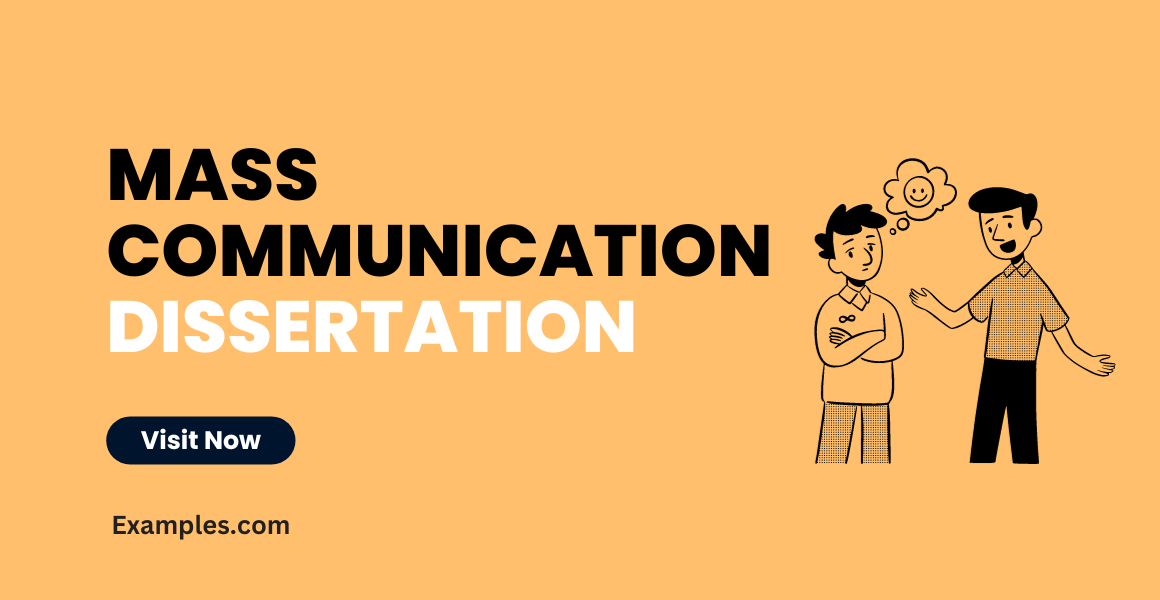Mass Communication Dissertation
Embarking on a Mass Communication Dissertation is a journey through the complex world of conveying impactful messages to diverse audiences. This comprehensive guide serves as a crucial resource for students and professionals delving into the intricate layers of Mass Communication Messages. It not only explores the theoretical frameworks but also provides practical insights into the dynamic field of mass communication. Whether you’re examining the Models of Mass Communication or investigating the latest trends in Mass Communication in a Digital Age, this guide equips you with the knowledge and tools necessary to craft a compelling dissertation. Understanding mass communication’s multifaceted nature and its profound influence on society is essential for any scholar or practitioner in this ever-evolving field.
Mass Communication Dissertation Examples
Explore pivotal Mass Communication Theories, analyze Digital Age trends, and study impactful Broadcasting and Social Media strategies in your dissertation.
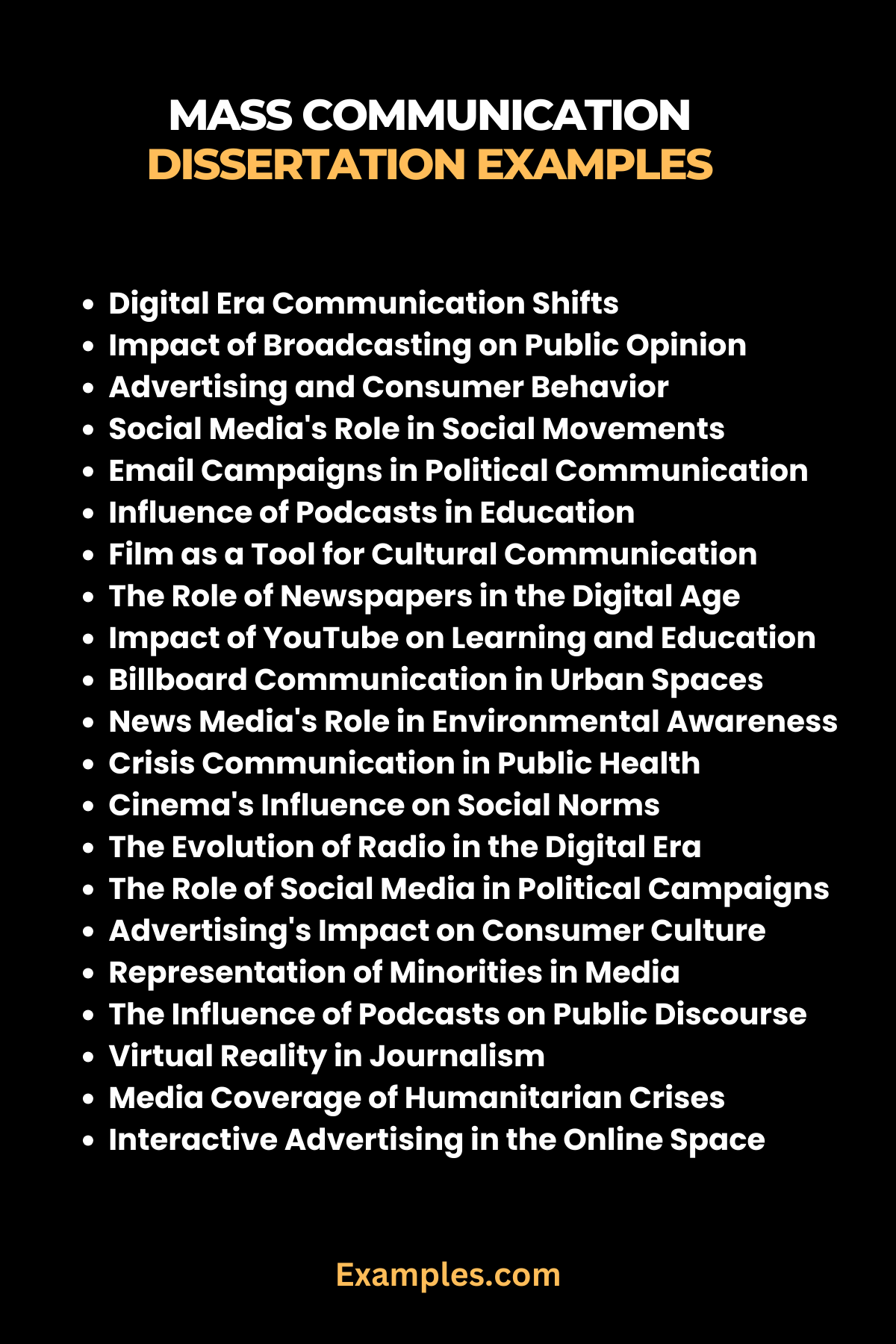
1. Advertising and Consumer Behavior: This delves into how visual and textual messages on billboards influence consumer behavior, demonstrating the practical applications of Mass Personal Communication in advertising strategies.
- Example: Researching the effectiveness of billboard advertising in urban areas and its influence on consumer choices, applying Mass Communication in Advertising principles.
2. Impact of Broadcasting on Public Opinion: This explores the influential role of television in shaping political narratives, using theories like Agenda-Setting and Framing to understand the power dynamics in Broadcasting Mass Communication.
- Example: A case study of how television broadcasting, especially news channels, shape public opinion on political matters, using Television Mass Communication theory.
3. Digital Era Communication Shifts: This topic examines the transition from conventional news outlets to social media, highlighting the speed, reach, and interactivity of modern Mass Communication in Journalism.
- Example: Analyzing how social media platforms like Twitter have revolutionized news dissemination, contrasting traditional Journalism Mass Communication methods with modern digital practices.
4. Social Media’s Role in Social Movements: This topic investigates how visual storytelling on social media can mobilize public support, contrasting it with traditional PR tactics in Social Media Mass Communication.
- Example: Examining the use of platforms like Instagram in driving social movements, comparing it to traditional Public Relations Mass Communication strategies.
5. Email Campaigns in Political Communication: This study evaluates how targeted email messaging influences voter perceptions and behaviors, showcasing the evolving landscape of Mass Communication in Real Life scenarios.
- Example: Analyzing the effectiveness of email campaigns in local political races, focusing on Email Mass Communication strategies.
6. Influence of Podcasts in Education: This research delves into the integration of podcasting as a modern educational tool, highlighting its role as an innovative form of Mass Communication in Broadcasting.
- Example: Exploring the use of educational podcasts in enhancing learning experiences in high schools, aligning with Mass Communication Examples in School.
7. Film as a Tool for Cultural Communication: This focuses on films as a platform for showcasing diverse cultures, discussing their impact in promoting global understanding and empathy in the context of Mass Communication Messages.
- Example: Studying how international films serve as a medium for cross-cultural communication, relating to Mass Communication Theories like Cultural Theory.
8. The Role of Newspapers in the Digital Age: This topic analyzes how newspapers have adapted to digital mediums, maintaining relevance and effectiveness in the rapidly evolving landscape of Mass Communication Examples in a Digital Age.
- Example: Investigating the transformation of traditional newspapers in the digital era, focusing on the blend of Printing Mass Communication and digital media.
9. Impact of YouTube on Learning and Education: This research assesses how YouTube’s video content is utilized for educational purposes, exploring its role in modern learning environments and its impact as a form of Blog Mass Communication.
- Example: A study on the use of YouTube as an educational resource in universities, related to Mass Communication Examples in School.
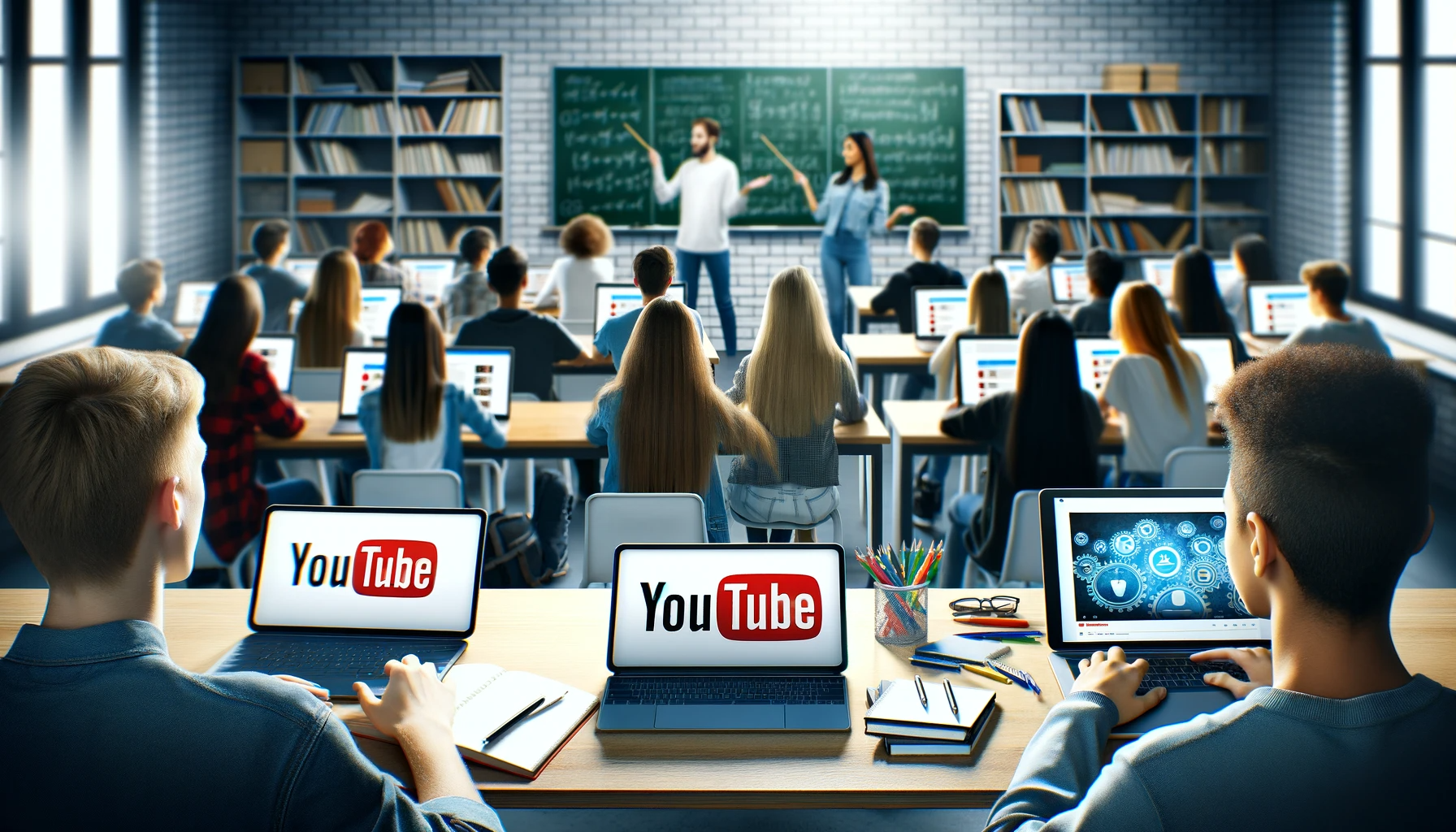
10. Billboard Communication in Urban Spaces: This study focuses on how billboard messages shape urban culture and consumer behavior, demonstrating the effectiveness and reach of Billboard Mass Communication in dense, urban settings.
- Example: Analyzing the influence of billboard advertising in major cities and its effects on urban culture, using principles of Mass Communication in Advertising.
11. News Media’s Role in Environmental Awareness: This topic investigates the influence of media in shaping public perception and awareness regarding environmental issues, highlighting the role of journalism in Mass Communication in Real Life.
- Example: Evaluating how news outlets cover climate change, using Agenda-Setting Theory from Mass Communication Theories.
12. Crisis Communication in Public Health: This study examines how different forms of mass media, including social media and television, have been used for disseminating crucial public health information, applying Mass Communication Scenario/ Situation analysis.
- Example: Analyzing the effectiveness of mass communication strategies during public health crises, such as the COVID-19 pandemic.
13. Cinema’s Influence on Social Norms: This dissertation explores how film as a medium of mass communication can both reflect and influence cultural norms, using frameworks from Mass Communication Theories.
- Example: Researching the impact of mainstream cinema on shaping societal attitudes and norms, particularly in the context of gender roles.
14. The Evolution of Radio in the Digital Era: Focusing on the transition and resilience of radio broadcasting, this research highlights the continued relevance and evolution of radio as a form of Mass Communication.
- Example: A historical analysis of radio’s adaptation and survival in the age of internet and digital media.
15. The Role of Social Media in Political Campaigns: This topic examines how political figures and parties leverage social media to engage with voters, demonstrating the shift towards Social Media Mass Communication in political contexts.
- Example: Studying the use of social media platforms in political campaigning, especially focusing on recent elections.
16. Advertising’s Impact on Consumer Culture: This research explores how advertising, especially through digital platforms, influences consumer behavior and societal trends, underlining the significance of Mass Communication in Advertising.
- Example: Investigating the role of advertising in shaping consumer culture, with a focus on online and digital advertisements.
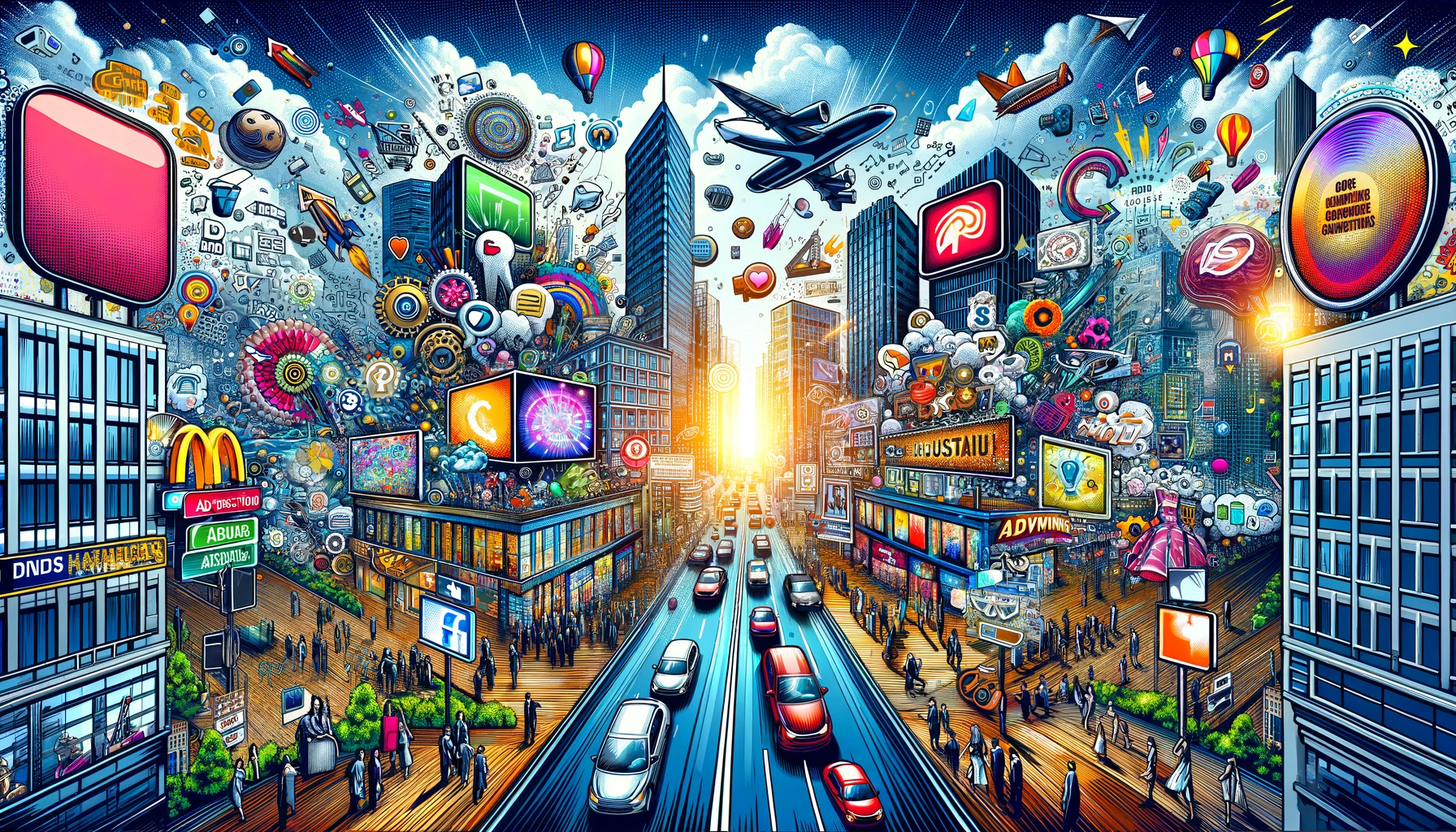
17. The Effectiveness of Health Communication Campaigns: This study evaluates the role of mass communication in disseminating health-related information and promoting public health initiatives, applying Mass Communication Scenario/ Situation analysis.
- Example: Assessing the impact of national health campaigns on public health behaviors and attitudes.
18. Representation of Minorities in Media: This dissertation explores the representation and implications of minority groups in mainstream media, addressing issues of diversity and inclusivity in Mass Communication Messages.
- Example: Analyzing the portrayal of ethnic and racial minorities in television and film.
19. Corporate Communication Strategies in Global Markets: Focusing on corporate communication strategies, this study discusses the challenges and techniques used in international marketing, reflecting on Mass Communication Examples in Real Life.
- Example: Examining how multinational corporations use mass communication to market products globally.
20. The Influence of Podcasts on Public Discourse: This topic assesses the impact of podcasts as a new form of mass communication, exploring their role in informing and influencing public opinion on critical social topics
- Example: Researching the growing role of podcasts in shaping public opinion and discourse on various social issues.
21. Virtual Reality in Journalism: This study explores how virtual reality is revolutionizing the field of journalism by offering more immersive and interactive storytelling experiences, reflecting on the evolving nature of Journalism Mass Communication.
- Example: Investigating the use of virtual reality technology in immersive journalism.
22. Social Media Influencers and Brand Communication: This research delves into how influencers on platforms like Instagram and YouTube are reshaping brand communication, marking a shift towards more personalized forms of Mass Personal Communication.
- Example: Analyzing the impact of social media influencers on brand communication strategies.
23. The Role of Memes in Digital Communication: This topic looks into how memes, as a form of digital content, contribute to online discourse and communication, highlighting a unique aspect of Mass Communication in a Digital Age.
- Example: Examining the significance and impact of memes as a communication tool in the digital age.
24. Media Coverage of Humanitarian Crises: This dissertation assesses how various media outlets report on humanitarian issues and the subsequent impact on public perception and response, using frameworks from Mass Communication Theories.
- Example: Studying the role and effectiveness of media coverage in shaping public response to humanitarian crises.
25. Interactive Advertising in the Online Space: Focusing on how interactive elements in online advertising enhance user engagement and influence consumer behavior, this research underscores the changing dynamics of Mass Communication in Advertising.
- Example: Exploring the evolution and effectiveness of interactive online advertising.
26. The Impact of Music Streaming on Cultural Trends: This study investigates the role of music streaming services in shaping contemporary music culture and trends, exploring a modern aspect of Mass Communication Examples in Real Life.
- Example: Analyzing how platforms like Spotify influence music consumption and cultural trends.
27. Media Literacy Education in Schools: This topic evaluates how media literacy education in schools prepares students to critically engage with mass media, tying into Mass Communication Examples in School.
- Example: Researching the implementation and effectiveness of media literacy programs in educational institutions.
28. The Dynamics of News Consumption on Mobile Devices: This dissertation explores how the use of smartphones and mobile apps has altered the way people consume news, illustrating a shift in Mass Communication Examples in a Digital Age.
- Example: Studying the changing patterns of news consumption with the advent of mobile technology.
29. Public Relations Strategies in Non-Profit Organizations: This research delves into how non-profits use mass communication to advance their causes, highlighting the nuances of Public Relations Mass Communication in a non-profit context.
- Example: Examining the unique public relations challenges and strategies employed by non-profit organizations.
30. Gender Representation in Video Game Marketing: This study focuses on how gender is portrayed in the marketing of video games and the impact of these portrayals on societal perceptions of gender, relating to broader Mass Communication Messages.
- Example: Analyzing the representation of gender in video game marketing and its societal implications.

What is a Dissertation in Mass Communication?
A Dissertation in Mass Communication is a comprehensive academic research project, typically undertaken as a crucial part of a postgraduate degree. It involves in-depth study and analysis of various aspects of mass communication, encompassing a range of topics from Mass Communication Theories to Digital Age media trends.
Purpose and Scope
The primary purpose of a dissertation in this field is to contribute original research or insights into the complexities of mass communication. It aims to explore the various modes, effects, and implications of communication on a mass scale, including Journalism Mass Communication, Broadcasting, and Social Media Mass Communication. The scope of these dissertations can vary widely, from empirical research studies to theoretical analyses, covering aspects like Mass Communication Characteristics, its impact on society, or the evolution of mass media platforms.
Process and Methodology
The process typically involves identifying a unique research question, conducting a thorough literature review, choosing an appropriate methodology, collecting and analyzing data, and finally, presenting the findings in a structured format. Methodologies can range from qualitative approaches like content analysis or interviews to quantitative methods like surveys or experiments, depending on the research question and objectives.
Significance and Relevance
A dissertation in mass communication holds significant relevance in understanding the ever-evolving landscape of media and communication. It provides insights into how mass communication affects public opinion, societal norms, and individual behavior. Furthermore, it helps in identifying new trends and challenges in the field, such as the impact of Social Media Mass Communication or the role of mass media in a Digital Age.
In summary, a dissertation in mass communication is a pivotal academic endeavor that not only advances a student’s understanding and expertise in the field but also contributes to the broader discourse on media and communication in today’s globalized world.
What are the Mass Communication Dissertation Topics?
When it comes to crafting a Mass Communication Dissertation, selecting the right topic is crucial. It sets the stage for your research and determines the scope of your study. The field of mass communication is vast and dynamic, encompassing various aspects such as Media Ecology Theory, digital media trends, public relations strategies, and the impact of mass media on society. Here, we provide a comprehensive guide to help you choose compelling and relevant dissertation topics in the field of mass communication.
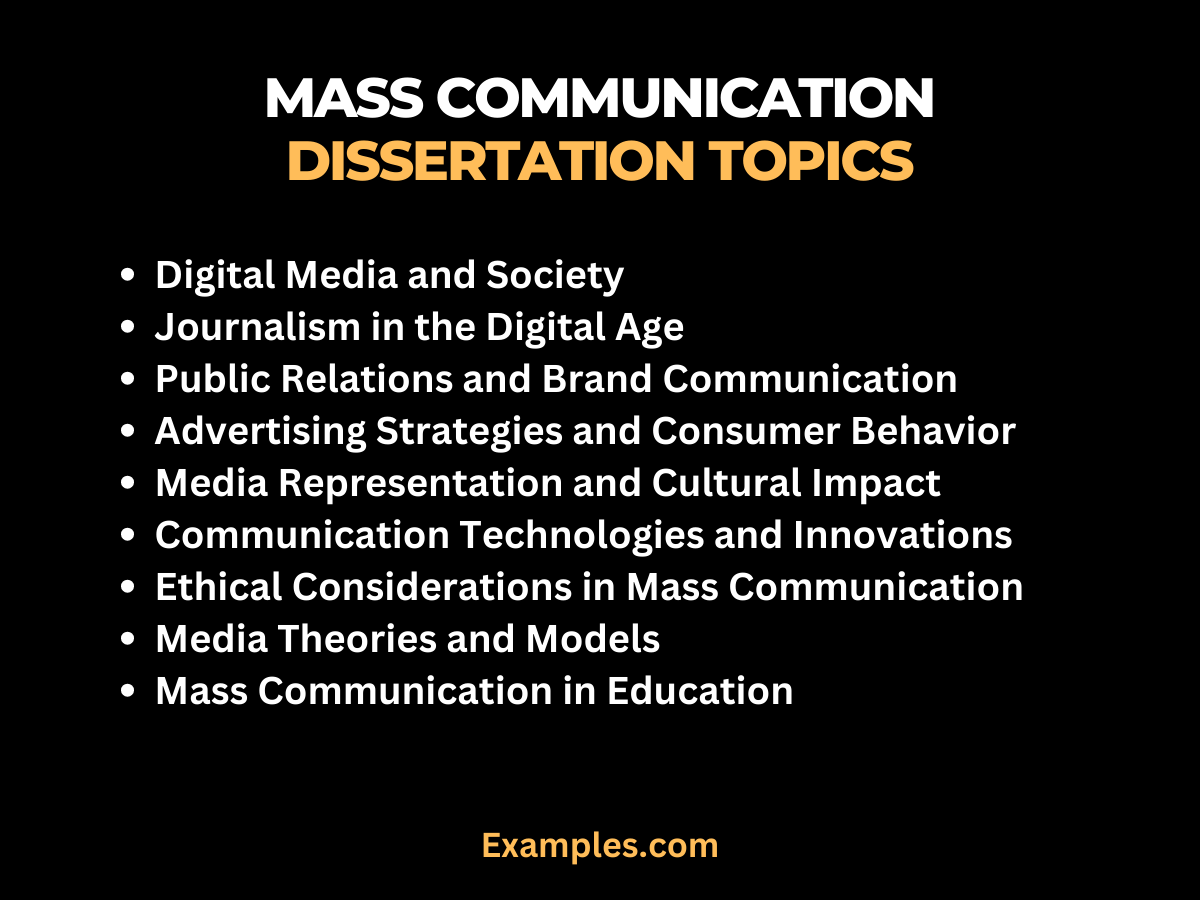
- Digital Media and Society: Explore how digital platforms like social media and blogs have transformed communication in society. This topic can delve into aspects like Social Media Mass Communication and its influence on public opinion, social movements, and personal interactions.
- Journalism in the Digital Age: Investigate how digital technology has revolutionized journalism. Topics can include the transition from traditional Journalism Mass Communication methods to digital platforms, the role of citizen journalism, and the challenges faced by the industry in the digital era.
- Public Relations and Brand Communication: Analyze the evolving role of public relations in brand communication. This topic can cover strategies in Public Relations Mass Communication, the impact of social media influencers, and the use of public relations in crisis management.
- Advertising Strategies and Consumer Behavior: Research the changing landscape of advertising and its impact on consumer behavior. Topics can include innovative Mass Communication in Advertising techniques, the use of digital platforms for targeted advertising, and the psychological impact of advertising messages on consumers.
- Media Representation and Cultural Impact: Study how media representation affects cultural perceptions and societal norms. This can include the portrayal of gender, race, and other social issues in various media forms and how these representations influence public perception and cultural trends.
- Communication Technologies and Innovations: Explore emerging technologies in communication, such as virtual reality, augmented reality, and artificial intelligence, and their potential impact on mass communication practices.
- Ethical Considerations in Mass Communication: Delve into the ethical challenges and considerations in mass communication, including issues related to media bias, misinformation, and the ethical use of technology in communication.
- Global Communication and Cross-Cultural Perspectives: Examine mass communication from a global perspective, focusing on how media operates and is consumed in different cultural contexts, and the role of global media in shaping cross-cultural understanding.
- Media Theories and Models: Investigate various Mass Communication Theories and models, such as the Agenda-Setting Theory, Cultivation Theory, and Framing Theory, and their relevance in contemporary media studies.
- Mass Communication in Education: Assess the role of mass communication tools and platforms in education, including the use of digital media in classroom settings, educational broadcasting, and the influence of media on learning and educational outcomes.
Tips for Using Mass Communication Dissertation
- Choose a Relevant Topic: Select a dissertation topic that not only interests you but also contributes to the field of Mass Communication. Whether it’s Social Media Mass Communication or Broadcasting Mass Communication, ensure your topic is both current and researchable.
- Incorporate Diverse Sources: Use a wide range of sources, from academic journals to case studies, to support your arguments. This is particularly important in fields like Mass Communication in Advertising and Journalism Mass Communication, where practical examples are as valuable as theoretical models.
- Apply Theoretical Frameworks: Ground your dissertation in established Mass Communication Theories. This will provide a solid foundation for your research and analysis.
- Utilize Modern Technologies: Embrace digital tools and platforms. For instance, analyzing Mass Communication Examples in a Digital Age requires familiarity with digital media and online research methods.
- Engage with Real-World Scenarios: Connect your research to real-life situations. Study Mass Communication Scenario/ Situation to understand how theories apply in practical settings.
- Stay Updated on Current Trends: Mass communication is a rapidly evolving field. Keep abreast of the latest trends, especially in dynamic areas like Social media Mass Communication and Email Mass Communication.
- Critically Evaluate Your Findings: Approach your research findings with a critical eye. This is particularly crucial when discussing Mass Communication Messages and their impact on various audiences.
- Seek Feedback Regularly: Regularly consult with your dissertation advisor or peers, especially when exploring complex topics like Mass Communication in Broadcasting or Public Relations Mass Communication.
- Focus on Clear Communication: Present your ideas clearly and concisely. This is vital in a field that revolves around effective communication, like Mass Communication.
- Ethical Considerations: Always consider the ethical implications of your research, especially when dealing with sensitive topics related to Mass Personal Communication and media influence.
Mass Communication Dissertation offers a deep dive into the ever-evolving landscape of media and its societal impacts. From exploring Digital Age transformations to analyzing Mass Communication Theories, these dissertations underscore the profound influence of media in shaping public opinion, culture, and communication trends. They reflect the dynamic and interconnected nature of modern mass communication.



